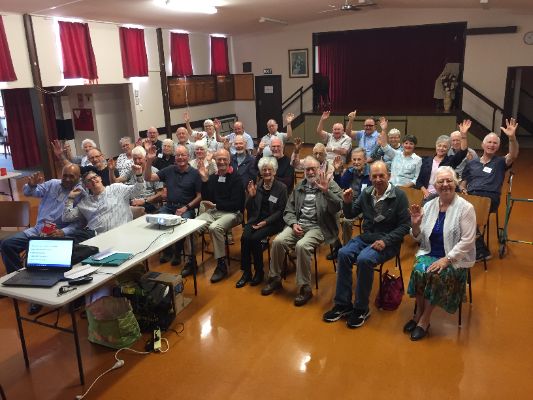Ground-Breaking Choir Improving Lives Of People With Neurological Conditions Celebrates 10th Anniversary
A ground-breaking choir which helps people with neurological conditions achieve a better quality of life is celebrating its 10th anniversary.
The Brainwave Singers marked the special occasion by raising $2000 for Parkinson’s New Zealand, a cause close to their hearts. The group caters to all neurological conditions but mostly uses singing to improve speech and communication in Aphasia (stroke) sufferers and to improve volume and clarity of speech in people with Parkinson’s.
The choir’s founder, Bay of Plenty District Health Board (BOPDHB) Speech and Language Therapist Robin Matthews, said it was wonderful to celebrate the group’s 10th birthday with the fundraiser, as invitees gathered for an evening of singing, raffles and a buffet dinner at Pacific Coast Village, Mount Maunganui.
“It’s lovely to be able to give something back,” he said. “Over the years the choir has also raised money for the Neurological Foundation and for the Stroke Association.”
The fundraising evening was a great opportunity to connect with the community after COVID-19 halted the choir’s weekly practises. Choir numbers didn’t suffer though, and Robin said it was fantastic to see so many members back when it started up again.
“There are about 50-60 members when everyone comes. The choir is a distraction for them. It’s a big social gathering and the members are thinking about something other than their health and doing something fun. It’s become so much more than a choir – it’s a mutually supportive group. It’s as much therapy for me as it is for them,” Robin laughed. “It’s so uplifting.”
Robin previously completed his PHD on the benefits of singing to improve speech for people living with Parkinson's disease. There had been few studies looking at singing as a means of improving the voice. His research found the singers had significant post-treatment improvement in psychological and psychosocial well-being including their levels of stress, anxiety and depression. The research also found significant improvement in voice quality of the singers, with them sounding less croaky or hoarse. The singer's vocal chord efficiency also improved.
“There are a number of reasons why one might expect singing to be beneficial,” said Robin. “There is the group aspect, which is often therapeutic, as well as doing something that is inherently rewarding to the brain. It’s more fun to want to keep practicing.
“We know that singing makes us feel good, now science is discovering how singing can help people suffering from Parkinson's to Aphasia (stroke). Singing uses different parts of the brain. To sing, you have to remember the tune and words, then fill your lungs with air, produce a voice and then coordinate your voice and breathing whilst singing the melody. For people with Parkinson's, the coordination required helps produce a better, louder voice.
“For people who have had a stroke; research shows they can regain the ability to talk by learning to sing words they are unable to speak. If the brain's language centres are damaged, neural plasticity - 'rewiring' the brain - may train the part of the brain responsible for singing to take over the speech functions.”
The choir also welcomes members who have any other neurological conditions, which includes depression and dementia, and partners are encouraged to come along. If you feel you would like to join the choir, or know someone who might, email Robin on Robin.Matthews@bopdhb.govt.nz
“You don't have to be able to sing, that's not the point,” said Robin. “Anyone who has a neurological condition can join. The group is hugely supportive of one another and therapeutically the experience is very uplifting. It's physiotherapy of the voice; singing as therapy.”



 PATHA: Health Professional Bodies Oppose Restrictions On Puberty Blockers
PATHA: Health Professional Bodies Oppose Restrictions On Puberty Blockers Universities New Zealand - Te Pokai Tara: Young Mathematics Talent Bound For Cambridge With Sir Douglas Myers Scholarship
Universities New Zealand - Te Pokai Tara: Young Mathematics Talent Bound For Cambridge With Sir Douglas Myers Scholarship Yachting New Zealand: NZ Windfoil Star Starts New Olympic Campaign With Bronze At Princess Sofia
Yachting New Zealand: NZ Windfoil Star Starts New Olympic Campaign With Bronze At Princess Sofia E tū: Bupa Roster Changes Put Residents And Caregivers At Risk
E tū: Bupa Roster Changes Put Residents And Caregivers At Risk Democratic Voice of Burma: The Resilience And Hope Of Myanmar’s People On Screen In Auckland Sat April 5
Democratic Voice of Burma: The Resilience And Hope Of Myanmar’s People On Screen In Auckland Sat April 5 NZSEG: Powering The Future - NZSE College And Royal New Zealand Navy Forge Educational Partnership
NZSEG: Powering The Future - NZSE College And Royal New Zealand Navy Forge Educational Partnership